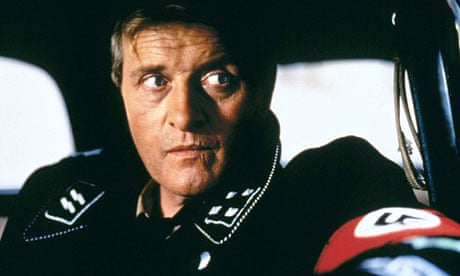The art of speculative fiction is the pursuit of small but ramifying differences. Robert Harris's Fatherland is not the first work of fiction to imagine the Germans as victors in the second world war. The author has acknowledged a debt, for instance, to Len Deighton's SS-GB. But it is singular in the rigour with which it imagines an alternative history. "Speculative fiction" might in the past have served as a synonym for science fiction, but it has come more strictly to refer to a historical scenario based on an alternative, but plausible, set of outcomes. A modern classic of this genre is Philip Roth's 2004 novel The Plot Against America, in which Charles Lindbergh defeats Roosevelt in the 1940 presidential election and leads America into antisemitism and isolationism.
Roth follows Harris in asking us to believe that the defeat of fascism was not inevitable. In Fatherland, Hitler has won. It is 1964 and the Greater German Reich stretches from the Low Countries to the Urals. Britain is some kind of client state of little interest to any of Harris's characters. (In mischievous fashion, Harris drops occasional "facts" about Britain into the narrative: an assured young SS officer has all the "English coolness" learned at the SS Academy in Oxford; the country is nominally ruled by King Edward VIII and Queen Wallis.) Harris makes his alternative history entirely concrete. In Berlin, where the novel is set, Albert Speer, Hitler's architect, has fulfilled some of the grand architectural designs of the fascist state. There is the Triumphal Arch and the Great Hall of the Reich ("the largest building in the world", as the tour guide announces). Berlin's airport is naturally the Flughafern Hermann Göring.
In this alternative world, Xavier March, a good cop despite his SS uniform, investigates the murder of an old man who was once an important Nazi bureaucrat. "It was all so normal," he thinks, of the gloomy Berlin day when the body is found. Normal for a fascist state. Naturally March cannot imagine the world being any different. The epigraph at the head of one of the novel's six parts proclaims, in Hitler's words, that "When National Socialism has ruled long enough, it will no longer be possible to conceive of a form of life different from ours."
We find out about recent history by accident and flashback. The earliest change made to real events is the failure of the assassination attempt on Reinhard Heydrich in Prague in 1942. (In historical fact, Heydrich, though wounded, seemed to have survived the attack by Czech partisans, but later died in hospital of septicaemia.) This alternative is, of course, perfectly likely. Heydrich can become the state's evil genius, never present in the novel but always behind the plot.
Fatherland is clearly influenced by George Orwell's Nineteen Eighty-Four, fiction's template for the workings of a totalitarian society: March's young son is a solemn enthusiast for party values who eventually betrays him; the nation is in a state of perpetual war with the hordes of Russia. The Nazi state is not, however, the perfected tyranny that Orwell creates, where even the most private rebellion is inevitably noticed by the authorities. Power in this Fatherland is more frayed. Some people listen to American radio stations; groups of the urban young grow their hair and wear unconventional clothes; the Beatles have apparently played in Hamburg, though pop music is officially deplored. There are hints of the 1960s. This is alternative history, not allegory. The fraying of power is important to Harris's use of the other genre he exploits: the police procedural. It must be conceivable in this fictional world for a clever and brave investigator – the traditional police detective transposed into a nightmare situation – to find out the terrible truth that has been hidden from Germans as well as from the rest of the world.
One wonders if this book's success was one reason for the proliferation of "counter-factual" histories in the last couple of decades. What this genre plays on is our sense of contingency. There is no divine plan. No outcome is inevitable. Evil is as likely to triumph as good. Harris's axiom is German victory over the Soviet Union, its remaining forces driven back beyond the Urals. The US is too powerful to be defeated, but with the conquest of Britain there can be no D-Day. The conceit behind the book is a nightmarish one: not only that the Nazis have won, but that, with the old leaders dead or ageing and a smoother new generation taking over, détente with this monstrous regime becomes necessary. The plot of Fatherland is set in motion by Heydrich's efforts to insure that those entrusted with knowledge of the "final solution" – die Endlösung – do not emerge to stand in the way of a rapprochement with the United States. The grimmest speculation plays by the rules of a German idea: realpolitik.

Comments (…)
Sign in or create your Guardian account to join the discussion